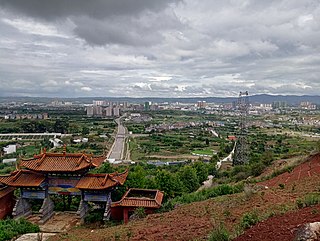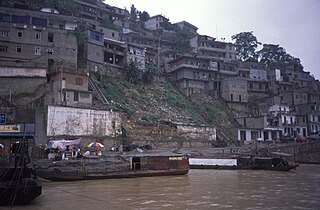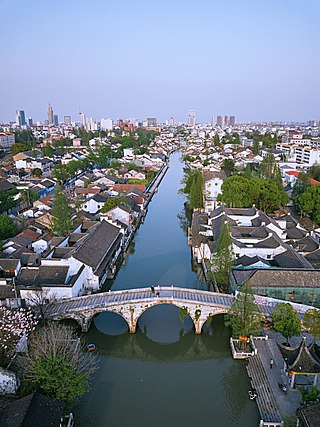
Suzhou is a major prefecture-level city in southern Jiangsu province, China. As part of the Yangtze Delta megalopolis, it is a major economic center and focal point of trade and commerce.

Shaoxing is a prefecture-level city on the southern shore of Hangzhou Bay in northeastern Zhejiang province, China. Located on the south bank of the Qiantang River estuary, it borders Ningbo to the east, Taizhou to the southeast, Jinhua to the southwest, and Hangzhou to the west. As of the 2020 census, its population was 5,270,977 inhabitants among which, 2,958,643 lived in the built-up area of Hangzhou–Shaoxing, with a total of 13,035,326 inhabitants.

Wu is a major group of Sinitic languages spoken primarily in Shanghai, Zhejiang province, and parts of Jiangsu province, especially south of the Yangtze River, which makes up the cultural region of Wu. The Wu languages are at times simply called Shanghainese, especially when introduced to foreigners. The Suzhounese variety was the prestige dialect of Wu as of the 19th century, but had been replaced in status by Shanghainese by the turn of the 20th century, coinciding with a period of rapid language change in the city. The languages of Northern Wu constitute a language family and are mutually intelligible with each other, while those of Southern Wu neither form a phylogenetic language family, nor are mutually intelligible with each other.

Yue, also known as Yuyue, was a state in ancient China which existed during the first millennium BC – the Spring and Autumn and Warring States periods of China's Zhou dynasty – in the modern provinces of Zhejiang, Shanghai and Jiangsu. Its original capital was Kuaiji ; after its conquest of Wu, Yue relocated its court north to the city of Wu. Yue was conquered by Chu in 333 BC.

Jiashan County is a county in the north of Zhejiang Province, bordering Shanghai to the northeast and Jiangsu province to the north. It is administered by the prefecture-level city of Jiaxing. Jiashan is nicknamed "The Land of Fish and Rice", and is 80 km (50 mi) southwest of central Shanghai, 95 km (59 mi) east of Hangzhou, and 90 km (56 mi) south of Suzhou. The county seat is located on 126 People Avenue, Weitang Town.
Gu Zhun was a Chinese intellectual, economist and pioneer of post-Marxist Chinese liberalism. A victim of "anti-Rightist" purges, he spent his later life in prisons and reeducation centres.
Gu Yong, courtesy name Yuantan, was a Chinese calligrapher, musician, and politician. He served as a minister and the second Imperial Chancellor of the state of Eastern Wu during the Three Kingdoms period of China. Born in the late Eastern Han dynasty in the Jiangdong region, Gu Yong studied under the tutelage of Cai Yong in his early years and earned high praise from his mentor. He started his career as a county chief and served in various counties throughout Jiangdong. Around the year 200, he came to serve the warlord Sun Quan, who controlled the Jiangdong territories, and performed well in office as an acting commandery administrator. After Sun Quan became the ruler of the independent state of Eastern Wu in 222, Gu Yong steadily rose through the ranks as a minister and ultimately became Imperial Chancellor. He held office for about 19 years from 225 until his death in 243.
Xu Gong was a Chinese politician and minor warlord who lived during the late Eastern Han dynasty of China.
Shen Faxing was an official of the Chinese Sui dynasty who, after Emperor Yang was killed in a coup led by the general Yuwen Huaji in 618, seized the area of present-day Zhejiang and southern Jiangsu and declared himself the king of Liang (梁王). He was defeated by Li Zitong in 620 and, believing that he was doomed, committed suicide by jumping into a river.

Zhang Sengyou was a Liang dynasty painter in the ink style in the reign of Emperor Wu of Liang.

Shilin Yi Autonomous County is an autonomous county, under the jurisdiction of Kunming, the capital of Yunnan province, China.

Wuxia Gorge, sometimes called Great Gorge, is the second gorge of the Three Gorges system on the Yangtze River, People's Republic of China. Formed by the Wu River, it stretches 45 km (28 mi) from Wushan to Guandukou, and is located downstream of Qutang Gorge and upstream of Xiling Gorge. The gorge straddles the boundary between Wushan County of Chongqing Municipality and Badong County, Hubei Province.

China National Highway 204 (G204) runs from Yantai in Shandong Province to Shanghai. It is 1,031 kilometres in length and runs south from Yantai, going via Shandong and Jiangsu Province, and ends in Shanghai.

Taihe County is a county of southwest Jiangxi province, People's Republic of China, situated on the west (left) bank of the Gan River. It is under the jurisdiction of the prefecture-level city of Ji'an, 37 kilometres (23 mi) to the north-northeast.
Yang Kuan, styled Kuanzheng (寬正), was a Chinese historian specializing in pre-Qin dynasty Chinese history. He is considered an authority of the Warring States period, and his History of the Warring States, first published in 1955, remains the most authoritative treatment of the subject.
Xuzhou as a historical toponym refers to varied area in different eras.

Lu Ji (188–219), courtesy name Gongji, was a Chinese politician and scholar serving under the warlord Sun Quan in the late Eastern Han dynasty of China. He was also one of the 24 Filial Exemplars.
Kuaiji Commandery, formerly romanized as K'uai-chi Commandery, was a former commandery of China in the area of Hangzhou Bay. When first established, its capital was at Wu, which became known as "Kuaiji" from this role. The initial territory ran from the south bank of the Yangtze through most of modern Zhejiang to an indeterminate border among the free people of Minyue. Wu and Wuxing commanderies were later formed between the Yangtze and the north shore of Hangzhou Bay; the administration of the remainder of Kuaiji Commandery was then removed to the site of the former Yue capital in modern Shaoxing's Yuecheng District, which also became known as Kuaiji from this role. By the Tang, Hangzhou was also separated and Kuaiji ran from a little north of the Zhe River in the west to Ningbo in the east.
Zhao Juzhen was a Tang dynasty politician who served during the reign of Emperor Xuanzong of Tang. He was the founder of Huating County, the first county-level division in Shanghai.

The Dacang Bridge is a historic stone arch bridge over the Old City River in Songjiang District of Shanghai, China.













